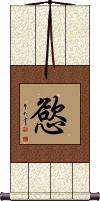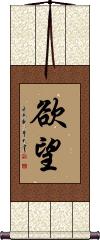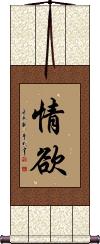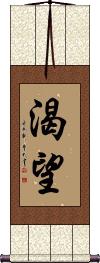Many custom options...
And formats...

Desire Longing Craving in Chinese / Japanese...
Buy a Desire Longing Craving calligraphy wall scroll here!
Personalize your custom “Desire Longing Craving” project by clicking the button next to your favorite “Desire Longing Craving” title below...
Desire / Longing / Craving
慾 means desire, longing, appetite, wish, covetousness, greed, passion, desire, avarice, and craving.
慾 is universal in Chinese, Japanese Kanji, and Korean Hanja.
The context in which this character is used determines whether the meaning is good or bad. As a single character on a wall scroll, you get to decide what the definition is to you (hopefully more toward desire than greed).
![]() Please note that Japanese use a simplified version of this character - it also happens to be the same simplification used in mainland China. Click on the character to the right if you want the Japanese/Simplified version of desire.
Please note that Japanese use a simplified version of this character - it also happens to be the same simplification used in mainland China. Click on the character to the right if you want the Japanese/Simplified version of desire.
Desire / Craving
欲望 is a word that means strong desire, while some might translate it as “lust.”
The first character of this word means desire, longing, hunger, covetousness, greed, passion, desire, craving, or wish. The second character means to hope for, ambition, desire, aspire, expect, gaze (into the distance), or look for something.
Lust / Desire / Passion
情欲 can be defined as lust, sexual desire, sensual desire, carnal desire, carnal passions, sexual desire, and passion.
The first character means feeling, emotions, passionate, sympathy, affection, love, compassion, tender feelings, and sometimes circumstances or facts.
The second character means desire, longing, appetite, wish, covetousness, greed, passion, desire, and craving.
This word is universal in Chinese, Japanese Kanji, and Korean Hanja.
Desire
This Chinese word can mean desirous, wishful, or desire.
The first character means to thirst for [something] or to be thirsty. The second character means to hope for, to expect, to gaze (into the distance), or to look for something. The combined meaning of these two characters changes a bit, but I think it's nice to know the individual meanings to give you a better understanding of where a word comes from.
Korean definitions of this word include craving, longing, and thirst for knowledge.
This in-stock artwork might be what you are looking for, and ships right away...
Decorative Missing Your Hometown
Decor Scroll
Discounted Blemished
Gallery Price: $108.00
Your Price: $59.88
Gallery Price: $60.00
Your Price: $36.88
Not the results for desire longing craving that you were looking for?
Below are some entries from our dictionary that may match your desire longing craving search...
| Characters If shown, 2nd row is Simp. Chinese |
Pronunciation Romanization |
Simple Dictionary Definition |
貪 贪 see styles |
tān tan1 t`an tan tan; ton; don たん; とん; どん |
to have a voracious desire for; to covet; greedy; corrupt (1) coveting; (2) {Buddh} (usu. とん) raga (desire) rāga; colouring, dyeing, tint, red; affection, passion, vehement longing or desire; cf. M. W. In Chinese: cupidity, desire; intp. tainted by and in bondage to the five desires; it is the first in order of the 五鈍使 pañca-kleśa q. v., and means hankering after, desire for, greed, which causes clinging to earthly life and things, therefore reincarnation. |
慾望 欲望 see styles |
yù wàng yu4 wang4 yü wang yokubou / yokubo よくぼう |
desire; longing; appetite; craving (irregular kanji usage) desire; appetite; lust |
The following table may be helpful for those studying Chinese or Japanese...
| Title | Characters | Romaji (Romanized Japanese) | Various forms of Romanized Chinese | |
| Desire Longing Craving | 慾 欲 | yoku | yù / yu4 / yu | yü |
| Desire Craving | 欲望 | yokubou / yokubo | yù wàng / yu4 wang4 / yu wang / yuwang | yü wang / yüwang |
| Lust Desire Passion | 情欲 | jouyoku / joyoku | qíng yù / qing2 yu4 / qing yu / qingyu | ch`ing yü / chingyü / ching yü |
| Desire | 渴望 | kě wàng / ke3 wang4 / ke wang / kewang | k`o wang / kowang / ko wang | |
| In some entries above you will see that characters have different versions above and below a line. In these cases, the characters above the line are Traditional Chinese, while the ones below are Simplified Chinese. | ||||
Successful Chinese Character and Japanese Kanji calligraphy searches within the last few hours...










